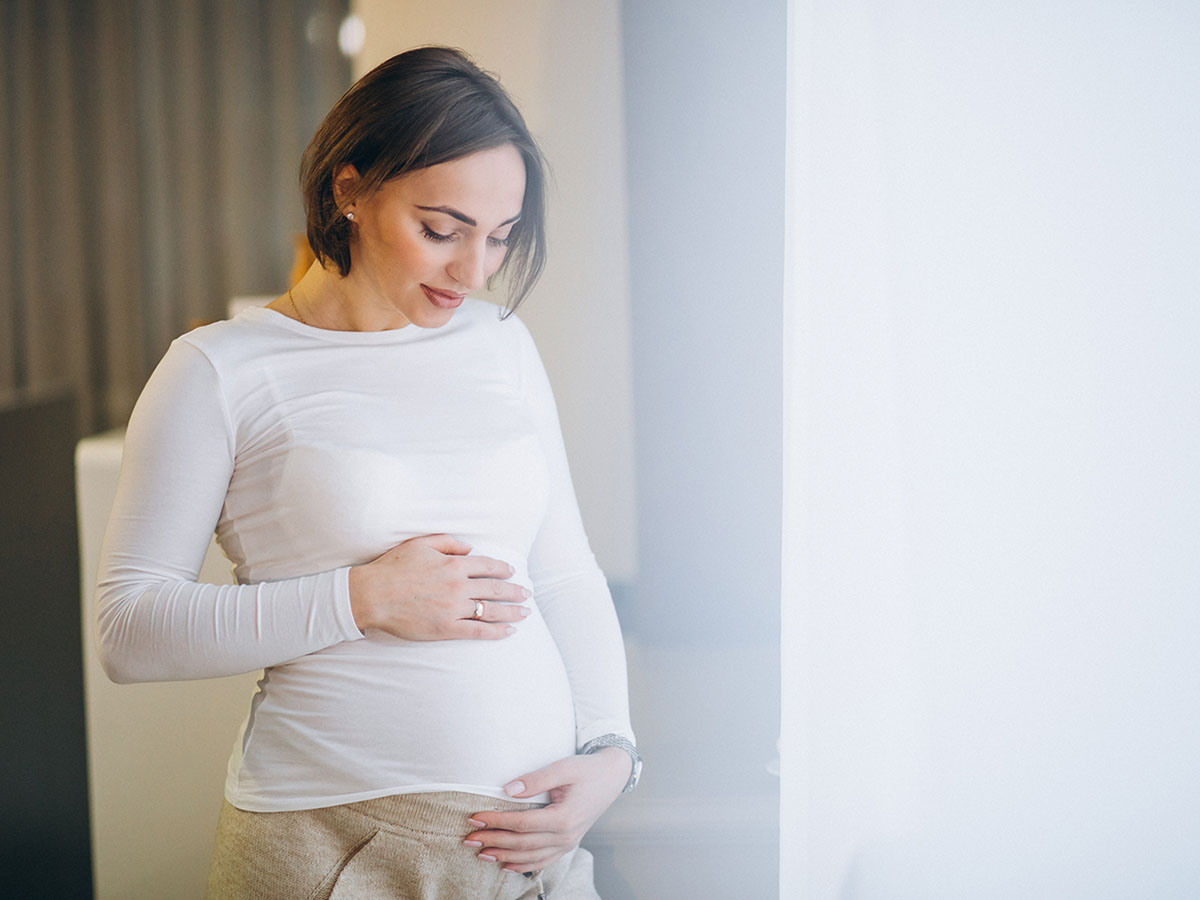
If you’re pregnant and have concerns about the impact of COVID-19 on you and your baby, you’re not alone. Our OBGYNs offer answers to common questions.
The COVID-19 pandemic has upended our lives and routines in myriad ways. Whether it’s concerns about prenatal care, labor and delivery or transmitting the novel coronavirus to their unborn child, women are facing a host of new challenges and questions as they navigate pregnancy during a global pandemic.
Obstetrician and gynecological experts at Keck Medicine of USC answer questions that are top-of-mind for many pregnant women.
1. If I’m pregnant, am I at higher risk for getting COVID-19?
Currently, there is no evidence to suggest that pregnant women are more likely to get COVID-19 than women who aren’t pregnant, although contracting COVID-19 during pregnancy might increase the risk for severe illness, according to the Centers for Disease Control and Prevention (CDC).
“In general, pregnant women are at higher risk of complications from diseases caused by infections when compared to the rest of the population,” our experts explain. “This is because the immune system tunes down during pregnancy so that the mother’s body doesn’t reject the baby.”
Pregnant women with COVID-19 may also be more likely to require hospitalization in the intensive care unit or support from a ventilator.
“These risk factors are even higher for pregnant women with other medical conditions such as high blood pressure and diabetes. So, it makes sense to be extra careful,” they add.
If you think you may have the novel coronavirus while pregnant, contact your primary care provider and obstetrician.
2. Can COVID-19 be passed from mother to fetus?
Even though researchers continue to investigate how COVID-19 may impact a fetus, many questions remain unanswered.
“Whether this virus can pass to the baby via the placenta is still unknown. Most studies suggest this is not the case,” our experts say.
The CDC reports that some newborns have tested positive for COVID-19 shortly after birth, however, researchers cannot conclusively pinpoint when the newborns were infected — before, during or after birth.
Scientists are also exploring a possible link between COVID-19, preterm birth (delivery before 37 weeks of gestation) and stillborn deliveries.
Early data from a recent CDC report suggests that preterm birth is more common among pregnant women who are hospitalized for COVID-19. A second report from the CDC also found that pregnant women with the novel coronavirus were more likely to experience a stillborn delivery.
While these findings are concerning, our experts note that more studies are needed to better understand the effects of COVID-19 on pregnancy outcomes.
3. Should I take any special precautions to prevent COVID-19 during my pregnancy?
Maintaining your prenatal care plan and following recommended COVID-19 safety guidelines are important steps in protecting your health and the well-being of your baby.
“Keeping up with your prenatal visits is extremely important, and the health care environment is not a high-risk setting for exposure to COVID-19,” our experts advise.
If your pregnancy is low risk, your obstetrician can safely space out in-person office visits, she adds. Exploring whether your care team offers telehealth appointments is also worthwhile.
They recommend talking to your doctor about any safety concerns you may have and asking about what types of safety protocols have been put in place to protect patients. After your delivery, keeping up with your postpartum care is just as important.
You and your doctor can decide what strategy works best for you, but the key takeaway — whether you’re in your first trimester, close to your delivery date or have already given birth — is making sure that you and your baby receive the prenatal and postpartum medical care that you need.
4. How will COVID-19 impact my labor and delivery plan?
The pandemic has brought about a wide range of changes in how labor and delivery plans are managed, including how many people can be with you in the delivery room and how long you and your baby will remain hospitalized.
“Every hospital has its own protocols for COVID-19 and pregnancy, so it’s important to talk to your doctor about the particular requirements at your hospital. For example, you may encounter changes like being tested for COVID-19 when you’re admitted regardless of symptoms, having to wear face masks, having limits on visitors and being treated by a team using full personal protective equipment, or PPE,” our experts explain.
Talking to your care team and planning ahead of time can help you prepare for the arrival of your baby without missing a beat.
5. How can I manage anxiety or sadness during the pandemic?
Under normal circumstances, pregnancy can be a challenging time for a woman both physically and emotionally. Being pregnant and giving birth during COVID-19 can impact your mental health in a very big way, our experts say.
“Fluctuating hormones, during and after pregnancy, don’t help the situation, either,” they add.
If you’re experiencing anxiety, depression or postpartum depression, our experts recommend talking to your doctor as soon as possible so you can get the help you need. Your care team can also help you identify and manage any added stressors caused by the novel coronavirus and pregnancy.
“Behavioral therapy, along with online support groups where you can talk to other pregnant women and those who have already given birth, can be a huge support system and a way for you to develop tools to manage your anxiety and/or depression.”
Physical activity and staying in touch with friends and family can also help relieve stress. For some patients, short-term medication may be an option, our experts add.
“Be sure to take deep breaths and rest assured that your feelings are common, and you are not alone.”
Topics
